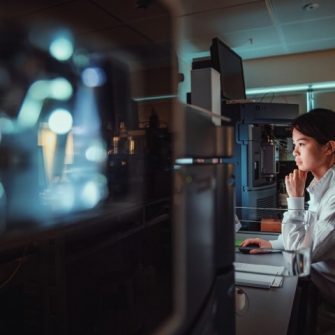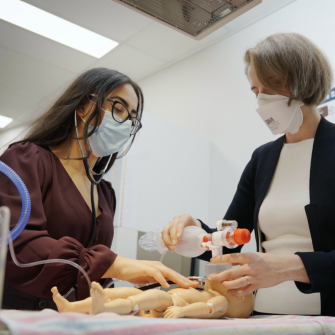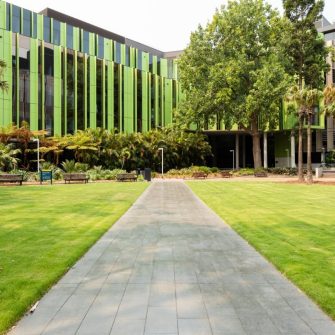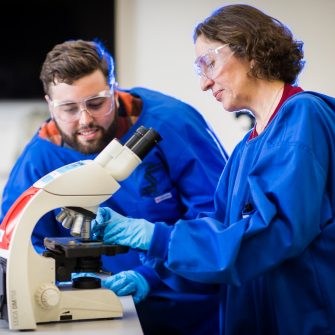Bachelor of Medical Studies/Doctor of Medicine/Arts
- Commencing Terms
- Term 1
- Duration
- 8 Year(s)
- Delivery Mode
- Face-to-face (includes blended)
- Campus
-
Kensington
- Codes
- UAC code 428000
- Program code 3856
- CRICOS code 079181D
-
ATAR/2025 lowest selection rank
- ATAR + UCAT ANZ + Interview View all admission criteria
-
2026 Indicative first year full fee
- $10,500*
-
2026 Indicative full fee to complete degree
- $102,500*
-
2026 Indicative first year full fee
- $99,500*
-
2026 Indicative full fee to complete degree
- $889,500*
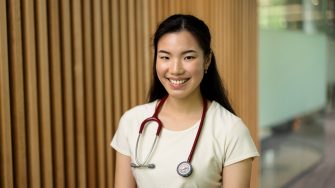
Join us at our Year 12 Medicine Info Eve
Wednesday, 11 March 2026 | 6-7pm AEDT | Online
Gain insight into the dynamic blend of hands-on clinical experiences and research-focused learning at UNSW Medicine. You’ll also find out detailed information on the application and admissions process for 2027 entry.
Join us at our International Medicine Info Session
Thursday, 19 March 2026 | 6-7pm AEDT | Online
Start your medical career at one of the top medical schools in the world. Find out everything you need to know about the international application and admissions process for beginning your studies with us in 2027.
Application closures for 2026
International applications for all undergraduate programs, as well as postgraduate programs offered by the faculties of Arts, Design & Architecture, Engineering (excluding Master of Information Technology and associated programs) and Science are now closed to New Overseas Student Commencement (NOSC) for 2026 intakes.
Postgraduate programs offered by the Business School and the faculties of Law & Justice and Medicine & Health remain open. Master of Information Technology (and associated programs) also remain open.
- Overview
- Entry requirements
- What will I study?
- Future careers
- How to apply
- Fees & Scholarships
Overview
Complement your medical studies with an arts education. This degree offers the flexibility to shape your studies and pursue subjects you love in the humanities and social sciences during leave taken between phases of the medicine program.
Our medical program will prepare you for professional practice and empower you to lead the future of health. Through your arts degree, you can pursue a range of disciplines in the humanities and social sciences, including languages, arts, history, philosophy and business. The arts component of your study will help you develop transferable skills in critical thinking, communication and research. It offers a diverse range of internationally minded subjects, which brings a global perspective to your learning.
Key features
- Combined undergraduate/postgraduate degree
We’re one of the few universities in Australia that offers a medicine degree at an undergraduate level. You’ll enter our combined program as an undergraduate student and graduate with both a bachelor’s degree and the Doctor of Medicine. When you complete the Doctor of Medicine, you’ll be eligible for provisional registration with the Medical Board of Australia and be ready to commence the next phase of your career.
- Design your degree
Personalise a degree unique to your interests, aspirations, and career goals. You can explore culture-defining knowledge that spans the humanities, languages, media, social sciences, environment, and much more.
- Research skills and experience
In the research year of the medicine program, you’ll complete either an Independent Learning Project (ILP) or honours year on a topic of your choice. Research enhances your employability, widens your knowledge as a clinician and opens doors to career opportunities beyond clinical practice, like medical research.
Why study at UNSW?
Study the most in-demand degree in NSW
The Bachelor of Medical Studies/Doctor of Medicine was the most popular first preference choice in NSW for the last six years running (Universities Admissions Centre (UAC), 2018 - 2025).
Learn within a world-class biomedical precinct
You’ll be learning within the Randwick Health and Innovation Precinct – a world-leading health, education and research environment. Attracting the best clinicians and academics from around the world, the precinct fosters collaboration between healthcare professionals, providing an environment for ground-breaking research.
Leverage UNSW’s industry connections
Our strong industry links give you the opportunity to learn within Australia’s best hospitals and private practices. Gain valuable exposure to one of the world’s best healthcare systems and work and study as part of interdisciplinary teams on hospital wards. Study alongside some of Australia’s best medical researchers through our affiliated Independent Medical Research Institutes. Leverage our connections to gain professional opportunities and start building your own professional network.
Join our innovative health community
Our health community features award-winning educators, clinicians and leaders in medicine. You’ll have close engagement with our distinguished alumni community of celebrated doctors and researchers. You’ll be welcomed into our supportive community of healthcare professionals, who are working together to improve life for all.
Want to see more from UNSW Medicine and Health?
Entry requirements
This double degree is only open to students who have been accepted into the medicine program. If you wish to undertake this program, you’ll need to contact the Medicine Education and Student Office during your first year to apply to transfer into the double degree. To apply to study medicine, you’ll first need to determine which applicant category you fit under. Visit the how to apply page for more information.
-
- The 2025 Lowest Selection Rank (LSR) is the adjusted rank (ATAR plus adjustment factors) you would have needed to gain entry to this degree in 2025.
- The 2025 A levels score is based on four Advanced Level (A2) subjects. Entry scores are calculated from the best three or four A2 subjects (excluding repeated subjects) using the following values: A*=6, A=5, B=4, C=3, D=2, E=1. At most one Applied A Level subject may be included in the best four subjects used to calculate the aggregate.
- The 2025 IB Diploma is an indication of the IB you would have needed to gain entry to this degree in 2025. It is to be used as a guide only.
- The 2025 Lowest ATAR is the lowest ATAR (before adjustment factors were applied) to which an offer was made. Where <5 is listed, this indicates that less than 5 ATAR-based offers were made and so the score has not been published. N/A indicates no offers were made on the basis of ATAR.
*The Lowest ATAR to which an offer was made, for this program, is based on a UNSW Gateway Early Conditional Offer.
-
At UNSW, we are committed to ensuring prospective students have all the information they need in order to make informed decisions about their study options.
To assist you in gaining a better understanding of how Admissions works at UNSW, we have provided you with a summary of ATAR offers and the student profile.
We hope this information will help you identify the degree that is right for you.
Additional Selection Criteria
Assumed knowledge
For Medicine component: English Standard. English as a Second Language and Fundamentals of English are not considered suitable preparation. For Arts component: None
Adjustment Factors
Educational Access Scheme (EAS)
Factors such as illness, financial hardship, language difficulties or attending a particular school can mean you don't always get the best possible marks in Years 11 and 12. If one of these situations applies to you, submit an application for the Educational Access Scheme (EAS) via UAC. Eligible students can receive between 1 and 10 points towards their chosen UNSW degree.
Admission pathways
Our students come to us from many backgrounds and all walks of life. We offer a range of entry schemes to ensure the brightest minds have the opportunity to study with us. Explore your options below and get in touch with our future student advisors to discuss your path to UNSW.
Visit the special entry schemes page for detailed information on our medicine pathways, including:
- Gateway Entry Scheme
- Lateral Entry Scheme
- Rural Entry Scheme
- Indigenous Entry Scheme
- Students from other medical schools.
English language requirements
You may be asked to provide evidence of your English proficiency to study at UNSW depending on your educational background and citizenship. English language skills are vitally important for coping with lectures, tutorials, assignments and examinations - this is why UNSW requires a minimum English language competency for enrolment.
If you’re completing an Australian Year 12 qualification (e.g. NSW HSC or equivalent), you do not need to provide anything extra to prove your proficiency. Your qualification will be used as evidence of your English proficiency.
If you do need to provide evidence of your English proficiency, this will be indicated in your application. You can prove this by providing evidence that you meet one or more of the following criteria:
- English language tests and university English courses
- Prior study in the medium of English
- Other qualifications
If you need to improve your English skills before you start your degree, UNSW College’s Academic English Programs are for you. The programs are suitable for various English levels and help you prepare for university studies and life in Australia.
For more details, visit the English Language Requirements page.
International direct entry
Information for applicants with CBSE, HKDSE or Singapore A Levels Qualification
Calculating your CBSE Score:
Awarded by CBSE, average percentage marks across English or Hindi, and your best four remaining subjects. Where marks are given as a range, the mid-point for that range is used e.g. 75 to 80 = 77.5.
Calculating your HKDSE Score:
Entry requirements are based on the aggregate of the best 5 achieved category A subjects (category B and C subjects are not considered).
For subjects other than Citizenship and Social Development: level 5**=7 points, level 5*=6 points, level 5=5 points, level 4=4 points, level 3=3 points, level 2=2 points, level 1=1 point, Level U=0 point.
For subject Citizenship and Social Development: Attained=2 points, Unattained=0 point. Citizenship and Social Development will only be counted towards the aggregate if the 2 points awarded for Attained ranks among the student’s best five scoring subjects.
If Mathematics Compulsory Part and Extended Part (Module 1 or 2) are both presented, both scores can be counted.
Calculating your Singapore A Levels:
Due to significant changes to the GCE A-Level Curriculum and University Admissions Score (UAS) calculation effective 2026, UNSW assessment is currently under review.
Note: Entry requirements published on this page are correct as of the day of publication and may change without notice.
We do not accept secondary qualifications from this country. We may accept tertiary study results, please contact us for more information.
Please contact us for direct entry requirements.
Additional Selection Criteria
Admission pathways
If you do not meet the requirements for direct entry into your chosen degree, you may be eligible for a pathway program with UNSW College. UNSW College provides alternative entry options using university-approved content so that you can start your UNSW journey with confidence.
English language requirements
You may be asked to provide evidence of your English proficiency to study at UNSW depending on whether you are from an English-speaking background or non-English speaking background. English language skills are vitally important for coping with lectures, tutorials, assignments and examinations - this is why UNSW requires a minimum English language competency for enrolment.
If English is not your first language, you’ll need to provide proof of your English proficiency before you can be given an offer to study at UNSW. You can do this by providing evidence that you meet one or more of the following criteria:
- English language tests and university English courses
- Prior study in the medium of English
- Other qualifications
If you need to improve your English skills before you start your degree, UNSW College’s Academic English Programs are for you. The programs are suitable for various English levels and help you prepare for university studies and life in Australia.
For more details, visit the English Language Requirements page.
Check the specific English language requirements for this program
What will I study?
UNSW is introducing a new academic calendar from 2028.
We are moving to a new flex-semester calendar. What does this mean for your studies?
Program structure
This program allows you to complete the Bachelor of Medical Studies/Doctor of Medicine and Bachelor of Arts within seven or eight years. The medicine program is split into three phases, with two years in each phase. It’s recommended that you take your arts year in between the third and fourth year of the medicine program (middle of phase two), before you begin your research year.
Phase One: Scenario-based learning
In your first two years, you’ll learn the basic medical sciences in relation to the human life cycle and social/ethical/legal issues related to healthcare. Clinical and communication skills training also begins in this phase.
Phase Two: Practice-based learning
In your third year, you’ll gain increased clinical exposure in hospital placements with ongoing learning in biomedical and social sciences. Your fourth year is dedicated to research, where you’ll complete either the Independent Learning Project (ILP) or the Medicine Honours Program.
Phase Three: Independent reflective learning
Years five and six consist of clinical placements and include content from the basic medical and social sciences.
Full program structure
The Medicine/Arts program can be completed in seven or eight years of full-time study. To complete the combined program in seven years, you’ll need to complete an approved arts-focused Independent Learning Project (ILP) and an additional arts course above the normal study load (24 units of credit) in at least one term. All other students will require eight years to complete the combined program.
-
This phase consists of eight core courses. Basic medical sciences, clinical skills, teamwork, ethical/legal issues and socio-cultural aspects of health are anchored by clinical scenarios.
The majority of teaching in your first two years takes place at UNSW’s Kensington, Port Macquarie or Wagga Wagga campus and includes lectures, small group work, tutorials and practical classes held in laboratories. Clinical sessions are held in hospitals.
-
In your third year, you’ll undertake clinical placements and spend three days per week in hospitals, practicing and applying your clinical skills. Lectures, small group work, tutorials and practical classes are held on the other two days per week on campus.
In your fourth year, you’ll complete an Independent Learning Project (ILP) or the Medicine Honours Program. You’ll also complete 12 units of credit (generally two courses) of general education courses from a faculty other than Medicine & Health to broaden your education.
-
This phase consists of ten eight-week courses, including seven core courses in the major disciplines:
- Medicine
- Surgery
- Psychiatry
- Primary Care (General Practice)
- Obstetrics & Gynaecology
- Children’s Health (Paediatrics)
- Emergency/Selective
In this phase, almost all teaching is conducted in hospitals. It includes bedside tutorials, classroom tutorials, ward rounds and attendance at clinics.
-
Collaborative learning and teamwork are cornerstones of this program. Within each phase, vertical integration occurs, where you’ll collaborate with students from different years. For example, first and second year students are combined in Phase One in the second half of the year. This means you’ll play the roles of both learner and mentor as you progress through phases one, two and three.
-
In all phases of the program, you’ll be required to travel to various clinical environments associated with UNSW. These will be the predominant learning locations in Phases Two and Three.
The main hospitals located in Sydney used for clinical teaching are:
- Prince of Wales Hospital, Randwick
- St George Hospital, Kogarah
- St Vincent's Hospital, Darlinghurst
- Liverpool Hospital, Liverpool
- Sydney Children’s Hospital, Randwick
- Royal Hospital for Women, Randwick
- Sutherland Hospital, Caringbah
The main hospitals located outside of Sydney and in rural New South Wales and Victoria used for clinical teaching are:
- Wagga Wagga Base Hospital, Wagga Wagga
- Albury Base Hospital, Albury
- Wodonga Regional Health Service, Wodonga (Victoria)
- Port Macquarie Base Hospital, Port Macquarie
- Coffs Harbour Hospital, Coffs Harbour
-
To fulfill the requirements of your arts degree, you need to complete 96 units of credit within the Faculty of Arts, Design and Architecture (ADA). This needs to include a:
- a major specialisation (48 units of credit)
AND
a minor specialisation (36 units of credit)
ADA prescribed electives (12 units of credit)
OR
a second major specialisation (48 units of credit)
-
-
Your arts courses are generally taken between phases of the medicine program. It’s recommended that you start your arts courses in your second year of study. The best time to take a year off the medicine program to concentrate on your arts studies is in your third or fourth year, before doing your Independent Learning Project (ILP) and clinical refresher course.
Future careers
Our medicine graduates go on to pursue diverse and rewarding careers in a wide range of roles across the medical industry. Upon successful completion of this program, you’ll be eligible to apply for provisional registration with the Medical Board of Australia. This will allow you to commence your one-year hospital internship following graduation, which is required to gain general registration as a doctor in Australia.
Further study and experience will allow you to specialise in a specific area of medicine, such as general practice, paediatrics, cardiology, oncology, general surgery, orthopaedics, pathology, radiology or psychiatry. If you choose not to work as a medical practitioner in a hospital or private practice, this degree will also prepare you for other career opportunities in medical research, health policy and medical education.
The arts component of your degree has two key career benefits. Firstly, you’ll expand your knowledge beyond the medical realm, which can enhance your future career prospects. Secondly, the arts courses you choose can complement your medical degree. For example, you could use your arts degree to study a foreign language which will directly help you communicate as a clinician.
Accreditation
Upon successful completion of the Doctor of Medicine, you’ll be eligible to apply for provisional registration with the Medical Board of Australia. This will allow you to commence your one-year hospital internship following graduation, which is required to gain general registration as a doctor in Australia.
Our alumni
“Knowing that UNSW is a leader in medical research was really crucial in my decision making because I know the medical workforce is getting more and more competitive. UNSW builds research into its medical program, which means once you graduate, you’re in a much better position to get a job.”
Ashna Basu
Junior Medical Officer, Prince of Wales Hospital
How to apply
To study the Bachelor of Medical Studies/Doctor of Medicine at UNSW, you must sit the University Clinical Aptitude Test (UCAT ANZ). You’ll also need to apply through UNSW’s Medicine Application Portal before submitting a UAC application. The final step for entry into the degree is an interview.
- Step One: Register for the UCAT ANZ
- Step Two: Sit the UCAT ANZ
- Step Three: Submit a UAC Application
- Step Four: Apply via the Medicine Application Portal (MAP)
- Step Five: Attend an interview
If you’re successful based on our selection criteria and you’ve submitted your MAP and UAC applications, you’ll be invited for an interview, which will also count towards your overall application.
Admission process for Special Entry
Additional or different steps may need to be taken by applicants that apply under one of our special entry schemes - including Indigenous, Rural and Gateway applicants. Additional information and deadlines are available on our Special Entry Schemes page.
For further information on the application process, visit our dedicated how to apply page
To study the Bachelor of Medical Studies/Doctor of Medicine at UNSW, you must sit the University Clinical Aptitude Test (UCAT ANZ) or the International Student Admission Test (ISAT). You will need to submit an application via our Apply Online portal or through UAC. Applicants who completed a UAC application or are studying in UNSW Foundations are also required to apply via the Medicine Application Portal (MAP).
- Step One: Register for the UCAT ANZ and /or ISAT
Applicants need to provide their ISAT or UCAT ANZ registration number when they lodge their application. Once you have submitted one of the accepted tests of your choice (ISAT or UCAT ANZ), any subsequent submissions of the other test at a later date will not be considered for admission. - Step Two: Sit the UCAT ANZ and/or ISAT
- Step Three: Submit your application through UAC or our Apply Online portal. If you’re sitting an Australian or New Zealand high school qualification, you must apply through UAC. If you’re not sitting an Australian or New Zealand high school qualification, or if you have completed all or part of a tertiary degree program, you’ll need to submit your application via our Apply Online portal.
- Step Four: Apply via the Medicine Application Portal (MAP). This step only applies to applicants who submit a UAC application or applicants studying in UNSW Foundation Studies. Applicants who submit their application via the UNSW Admissions Team (the Apply Online system) are not required to complete an application via MAP.
- Step Five: Attend the interview.
If you’re successful based on our selection criteria and you’ve submitted your UAC/Apply Online portal/MAP applications, you’ll be invited for an interview, which will also count towards your overall application. Interviews are conducted via Zoom. Interviews commence in May and continue throughout the year for the following year’s Term One (T1) commencement.
For further information on the application process, visit our dedicated how to apply page
The information on this page is subject to change. Applicants are advised to monitor this page regularly.
Fees & Scholarships
Commonwealth Supported Place: Student Contribution Band 3
*The student contribution for a Commonwealth Supported Place is an indication only of the amount payable in Year 1 based on a standard full-time load of 48 credit points (1.0 EFTSL). The actual student contribution you will be liable for depends on your individual program of study and the calendar year in which you enrol. Actual fees are calculated upon enrolment. Student contribution amounts are subject to annual review by the university and may increase each year during your studies (subject to caps determined by the Australian Government), effective at the start of each calendar year.
The indicative fees listed here are based on an estimated average and are for tuition only - other fees and charges are not included.
Commonwealth Study Assistance such as Austudy, and Youth Allowance is available for some Masters degrees. For the most up-to-date information and list of degrees visit UNSW Current Student Financial Support.
*Fees are subject to annual review by the University and may increase annually, with the new fees effective from the start of each calendar year. The indicative fees listed here are based on an estimated average and are for tuition only, other fees and charges are not included. The amount you pay will vary depending on the calendar year to enrol, the courses you select and whether your study load is more or less than 1 Equivalent Full Time Student Load (8 courses per year).
Indicative fees are a guide for comparison only based on current conditions and available data. You should not rely on indicative fees. More information on fees can be found at the UNSW fees website.
Indicative fees to complete the program have been calculated based on a percentage increase for every year of the program. Fee increases are assessed annually and may exceed the indicative figures listed here.
Indicative fees to complete the program include tuition plus an estimate of study-related costs of approximately $1,000 per year. To find out more about other costs, visit UNSW International.
Scholarships
At UNSW, we award over $83 million in scholarships each year. We pride ourselves on rewarding excellence and making university accessible to students from all walks of life. Whether you’re a domestic or international student, our range of scholarships, prizes and awards can support your journey.
Progress starts here – at a world-leading university

Top 20 Worldwide
UNSW is ranked #20 university in the world
QS World University Rankings, 2024–2026

Most Employable Graduates
Winner of the AFR Most Employable University Award seven years in a row
AFR Top100 Future Leaders Awards, 2020–2026

Australia's #1 for Innovation
Highest number of startups and spinouts from university-developed tech
SCOPR report, 2024


